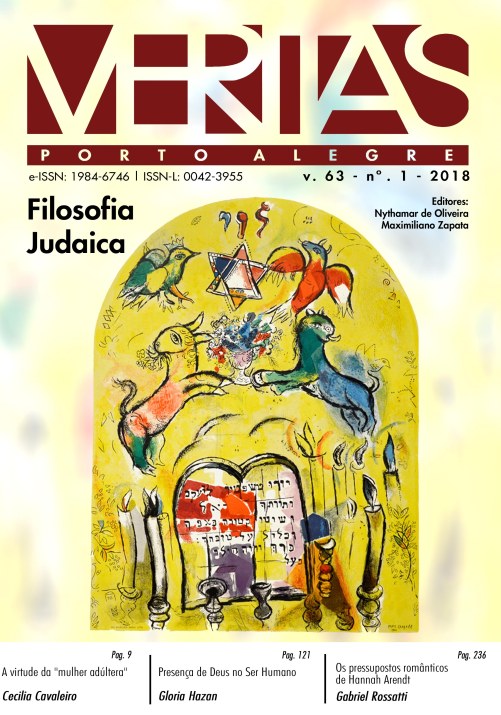Alethic Deflationism and Normativity: A Critique
DOI:
https://doi.org/10.15448/1984-6746.2018.1.29278Palabras clave:
Normativity, Alethic Deflationism, Paul Horwich, Michael Dummett, Filippo Ferrari, the world.Resumen
The paper starts by highlighting that virtually nobody would object to claims such as “to regard an assertion or a belief or a thought as true or false is to regard it as being right or wrong”—a claim that shows that truth is intrinsically normative. It is well known that alethic deflationists deny this. Paul Horwich, for instance, maintains that nothing shows that TRUTH is a normative concept in the way that OUGHT is. By relying on a distinction among dimensions of normativity I will try to pinpoint the weakness of Horwich’s argument in the fact that he works with a strong, uncalled-for, interpretation of normativity, whereas a weaker interpretation is more than enough. However, the impression might persist that a different understanding of the normativity of truth on the part of deflationists could eventually show the compatibility between alethic deflationism and normativity. The remaining part of the paper is devoted to contend that this is a wrong impression. Accordingly, it is stated that the normativity exerted by truth is ascribable in the final analysis to the world, and the provocative claim is defended that alethic deflationism lacks the conceptual resources to account for the relation between language and the world.
Descargas
Citas
Armour-Garb, B.P. and Beall, JC 2005 (eds.), Deflationary Truth, Open Court, Chicago.
Auxier, R.E. and Hahn, L.E. 2007 (eds.), The Philosophy of Michael Dummett, Open Court, Chicago.
Bilgrami, A. 2007, Pursuing an Analogy, in Auxier and Hahn 2007, 383-408.
Cozzo, C. 2014, Is Truth a Chimera?, in From a Heuristic Point of View: Essays in Honour of Carlo Cellucci, E. Ippoliti and C. Cozzo (eds.), Cambridge Scholars Publishing, Newcastle upon Tyne, 107-24.
Dummett, M. 1959, Truth, in Truth and Other Enigmas, Harvard University Press, Cambridge (MA), 1-24.
Dummett, M. 2007, Reply to Wolfgang Künne, in Auxier and Hahn 2007, 345-50.
Ferrari, F. 2016a, Disagreement about Taste and Alethic Suberogation, in “Philosophical Quarterly”, 66, 264, 516-35. DOI: https://doi.org/10.1093/pq/pqv116
Ferrari, F. 2016b, The Value of Minimalist Truth, in “Synthese”, DOI 0.1007/s11229-016-1207-9.
Ferrari, F. 2016c, Relativism, Faultlessness and Parity: Why We Should be Pluralists about Truth’s Normative Function, in “Argumenta”, 2, 1, 77-94.
Horwich, P. 1998, Truth, 2nd Edition, Clarendon Press, Oxford. DOI: https://doi.org/10.1093/0198752237.001.0001
Horwich, P. 2006, The Value of Truth, in “Noûs”, 40, 347-60. DOI: https://doi.org/10.1111/j.0029-4624.2006.00613.x
Horwich, P. 2016a, Wittgenstein on Truth, in “Argumenta”, 2, 1, 95-106.
Horwich, P. 2016b, Is TRUTH a Normative Concept?, in “Synthese”, DOI 10.1007/s11229-016-1208-8. DOI: https://doi.org/10.1007/s11229-016-1208-8
Künne, W. 2007, Two Principles Concerning Truth, in Auxier and Hahn 2007, 315-44.
Leeds, S. 1978, Theories of Reference and Truth, in Armour-Garb and Beall 2005, 33-49.
Lynch, M.P. 2001 (ed.), The Nature of Truth. Classic and Contemporary Perspectives, MIT Press, Cambridge (MA). DOI: https://doi.org/10.7551/mitpress/4884.001.0001
Lynch, M.P. 2009, Truth as One and Many, Clarendon Press, Oxford. DOI: https://doi.org/10.1093/acprof:oso/9780199218738.001.0001
Putnam, H. 1999, The Threefold Cord. Mind, Body, and World, Columbia University Press, New York.
Rorty, R. and Engel, P. 2007, What’s the Use of Truth?, P. Savidan (ed.), New York, Columbia University Press.
Descargas
Publicado
Cómo citar
Número
Sección
Licencia
Derechos de Autor
La sumisión de originales para la Revista Veritas implica la transferencia, por los autores, de los derechos de publicación. El copyright de los artículos de esta revista es el autor, junto con los derechos de la revista a la primera publicación. Los autores sólo podrán utilizar los mismos resultados en otras publicaciones indicando claramente a Revista Veritas como el medio de la publicación original.
Creative Commons License
Excepto donde especificado de modo diferente, se aplican a la materia publicada en este periódico los términos de una licencia Creative Commons Atribución 4.0 Internacional, que permite el uso irrestricto, la distribución y la reproducción en cualquier medio siempre y cuando la publicación original sea correctamente citada. Copyright: © 2006-2020 EDIPUCRS






